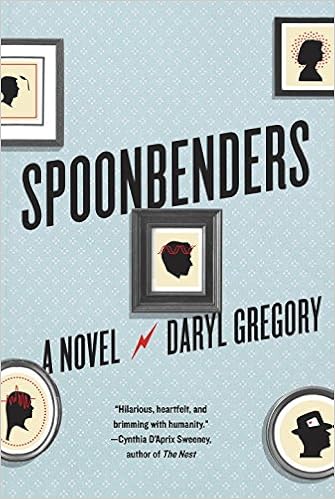Note: I received a copy of Spoonbenders from the publisher for review consideration.

Frabjous day! Daryl Gregory — one of my favorite new(ish) SF authors — has a new book out! Spoonbenders follows the adventures of the Telemachuses, who long ago achieved fame and fortune as the Amazing Telemachus Family, performing feats of telepathy, clairvoyance, and telekinesis for secret CIA projects and live television audiences. But that is all twenty years in the past, and matriach Maureen Telemachus is long dead. Then Matty, the only son of human lie detector Irene Telemachus, discovers suddenly that he can astral project.
The above summary is roughly how the book was advertised, and it is a correct description of events. BUT, the thing that it does not convey is that Spoonbenders is one of my favorite type of books, wherein an array of disparate plotlines culminate in one massive, climactic Event where all hell breaks loose yet somehow still manages to resolve every plotline. In the case of Spoonbenders, that event is Zap Day, 4 September 1995, the date on which the clairvoyant Buddy Telemachus stops being able to his own — or anyone else’s — future.
I tell you this because Spoonbenders is slow to start, and I want you to stick with it. In the beginning, it prominently features the con-happy male members of the Telemachus family. Patriarch Teddy shops for ladies to pick up at the grocery store; eldest son (and sporadic telekinetic) Frankie plans a theft that will allow him to pay off his debt to a local mobster; and fourteen-year-old Matty discovers his new powers while lusting after his older step-cousin, Mary Alice. Yawn.
As the book goes on, though, we spend more time with Irene, whom I adore, and with Buddy, who is constantly trying to work around the bits of future he’s foreseen to produce the best possible outcomes for the people he loves. Daryl Gregory has a knack for teasing out the small, mundane implications of his wild premises, and he gets at some genuinely fun (and sad, and weird) ideas with Irene and Buddy’s powers.
Plus, Zap Day makes for a terrific climax: all the pieces click perfectly into place, and we get to see each of the family members at their strange, unselfish best.
There’s a very minor subplot that bugged me. (Spoilers.) In a flashback, Buddy goes to a prostitute called Cerise. The book uses she pronouns for her and casually makes reference to her cock — which I thought was terrific as far as it goes. Later on, though, Buddy finds this same person, who now goes by Charles and works as a waiter, and for whom the book now uses he pronouns. Again, fine, gender can be fluid, etc., etc. But Charlie says, nervously, “I’m not in that line of work anymore,” and I dunno. It felt like the book had set up Cerise as trans to begin with, in this refreshingly unfussy way, only to align her transness with her career as a sex worker. I wasn’t wild about it. I’d love to hear other folks’ opinions.
Apart from that and the slow start, I enjoyed Spoonbenders a lot. It’s Martin Millar meets Sylvia Browne meets American Shameless, and I’m about it.